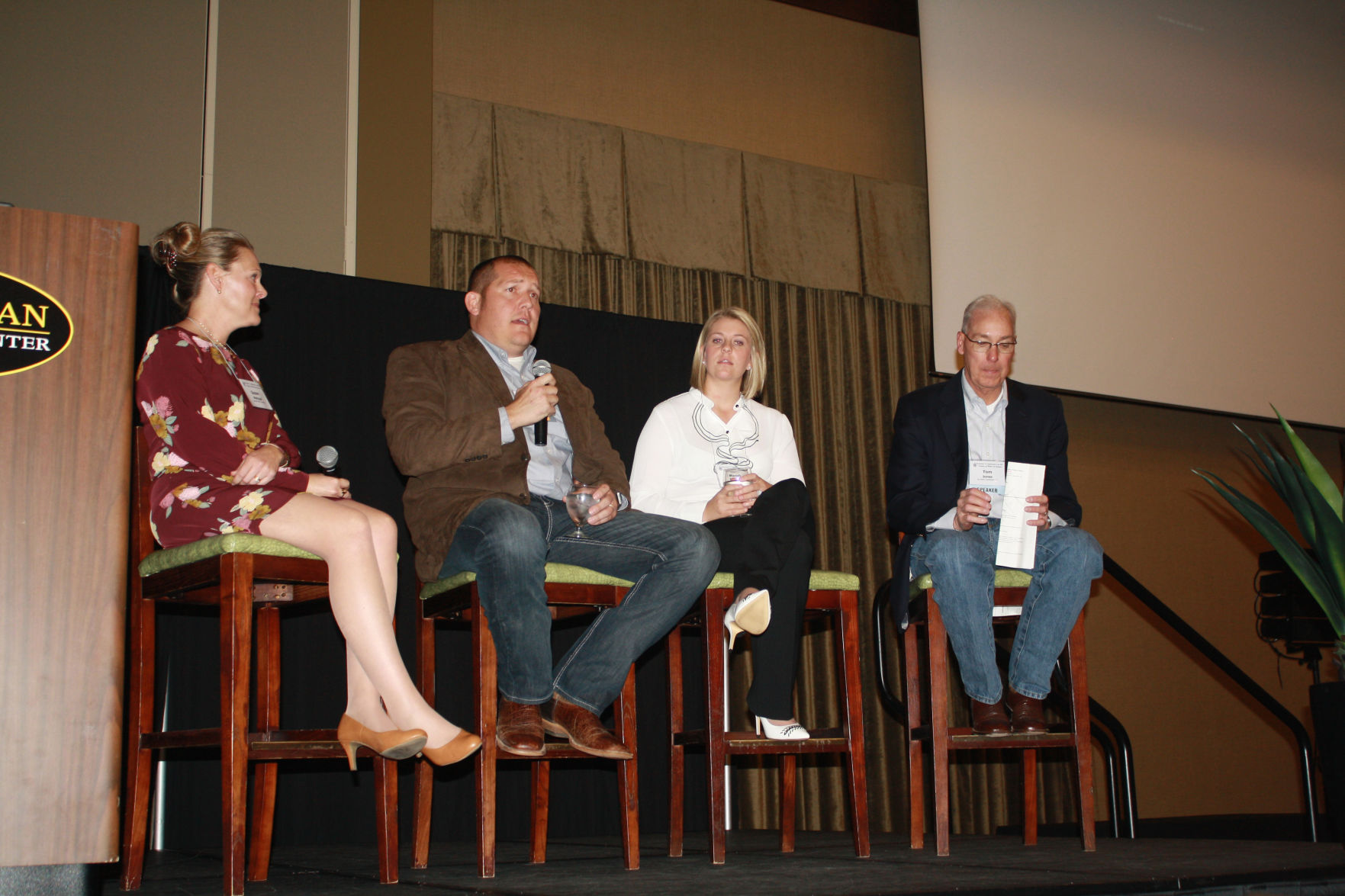What is sustainability? For Tom Jones, owner of Hy-Plains Feedyard LLC, Mariah Murphy, Land O’ Lakes account manager, and Matt Durler, vice president of marketing and risk management at ICM, believe sustainability in agriculture is doing more with less.
During the Governor’s Conference on the Future of Water in Manhattan, Kansas, from Nov. 13 to 14 at the Hilton Garden Inn Conference Center, the three touched on several areas of sustainability and conservation.
Jones owns and operates a 50,000 head feed yard in southwest Kansas and uses nearly half a million bushels of corn every month to manufacture thousands of pounds of feed every day.
“Our goal is to talk about how to plant some form of incentive between grain producers and cattle producers,” Jones said.
For Murphy and Land O’ Lakes, using technology is key in achieving their goals through sustainability.
“Through the Land O’ Lakes sustain effort, we are trying to bring together the best in agriculture technology with our industry leading technology products. We have to drive sustainability across the food system,” she said.
An example of their newest technology program is the Truterra Insights Engine.
“We are using Truterra for farmers to be able print a credit score per field for the grower to monitor and measure where they are at with their stewardship practices. These tools enable farmers to monitor where they are making and losing money in a field,” Murphy noted.
Stewardship indicators can also introduce new practices that producers possibly weren’t using before, Murphy stated.
Durler stated that ICM is taking the sustainability approach by fractionating distillers.
“We have developed technology that allows distillers grains to be tailored to the particular needs of each livestock species. This allows for less waste and more productivity,” Durler said. “In the end, our story of sustainability has to be how we use technology to do more with less, enabling us to produce the most efficient, nutritious and safest food anywhere in the world.”
Technology in use
Farmers are also participating in water technology farms to conserve water. This is part of the governor’s program that was implemented three years ago.
“Water technology farms are in place to help educate producers of the various irrigation technology that is available to reduce water use. This technology is not always purchased by the producers and or land owners. The Kansas Water Office and many other supporters help provide the funding to install the equipment on each technology farm,” said Armando Zarco, water resource planner at the Kansas Water Office.
Zarco stated by using the irrigation technology, they have seen that using mobile drip irrigation systems may only use up to two-thirds the amount of water as a standard irrigation sprinkler would use.
Farmers, researchers and teachers from across the state put their skills to the test with the water technology.
Risk management
For Nick Hatcher of Hatcher Tech Farm in Seward County, Kansas, risk management was a major concern for his operation.
“How do you mitigate risk in production agriculture? I was wanting to make sure I was putting enough water out on those crops to sustain it to make it viable, economically feasible and to be able to continue farming. I can tell you putting that much water on the fields is all about risk management,” Hatcher said.
A key aspect Hatcher learned from his water technology experience was being able to delay the watering process at the very beginning of the year.
“Even though we had gone through a drought, we realized with using the management tools and probes we did have adequate moisture and were able to hold off on starting those wells, which contributes to saving water,” Hatcher said.
Jacob Farms, based near Valley Center, Kansas, is a diverse no-till operation and has now added water technology to their strategy list.
The farm uses methods such as Aqua spy moisture probe, hand check moisture and evaporation scheduling. A new method the farm tried this year was direct plant sensing.
“Direct plant sensing is basically where sensors on a selected plant continuously monitor micro-variations of the stems diameter that are scientifically proven stress indicators. The data is then transmitted in real time to the Phytech cloud for further analytics,” said Ryan Speer of Jacob Farms.
In 2018, aside from saving on water use, Jacob Farms also saved $1,983 in electric energy, $2,744 in diesel fuel, $2,370 in propane and $1,123 in natural gas thanks to the water technology on their farm.
For Weston McCary, director of precision agriculture and unmanned aircraft systems at Northwest Kansas Technical College in Goodland, teaching his students how to sustain agricultural economic viability in western Kansas through workforce development, innovative technologies and sustainable practices has been crucial from the beginning.
“We teach all hands-on-deck here at the college,” McCary said.
The college educated growers about water technology they possibly hadn’t heard of before.
“Hearing our growers say, ‘Hey, I want to try some technology on our farm but I don’t know what to do or I don’t have the money to invest in it.’ That’s where we came in,” McCary said. “Thanks to sponsors, we are able to keep the technology for the farmers. If farmers weren’t up for the task the following year, or were wanting to continue using it, all they had to do was tell us and renew their term with a local dealer.”
Students at NWTC are working with technology from soil moisture probes; irrigation controllers; variable rate prescription speed tables; electro-conductive soil mapping; soil sampling and weather stations.
With the success of water technology farms, the Kansas Water Office is expanding their program in 2019.
Brooke Haas can be reached at [email protected].




